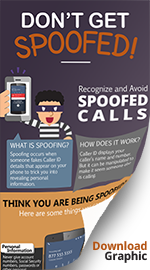Is that the Social Security Administration, the SSA, calling to say you're due a cost-of-living increase for your monthly benefit payments? That would be wonderful news, wouldn't it? While the person calling may sound official, the caller may actually be trying to steal your money.
The SSA has posted alerts about such phone scams in which a caller claims to be an SSA employee saying you're due a cost-of-living increase and asking you to verify personal information. In similar versions of the scam, the caller may say that "SSA computers are down" or may refer to enrollment in the Medicare prescription drug program. SSA says the scammers are using victims' information and trying to change their direct deposit accounts to steal their social security payments.

If you get any communication — phone call, email, letter or text — claiming to be from the SSA that seems suspicious, you should contact the SSA and ask for verification. If the SSA is unable to authenticate the communication you received, you should report it to the SSA Office of Inspector General at 1-800-269-0271 or online at https://oig.ssa.gov/report. If you feel you're the victim of a scam, you should also contact law enforcement.
The FCC regularly receives consumer complaints about phone scams and has recently received complaints about Social Security phone number caller ID spoofing.
The FCC cautions you to beware of caller ID spoofing, which occurs when scammers use advances in technology to disguise their identity in an attempt to trick you into giving away valuable personal information they can use to steal money from you. Spoofers can make your caller ID display the phone number of banks, creditors, insurance companies, or even the government, such as the IRS or, in this case, the SSA.
For tips on what you can do to protect yourself, check out the FCC's consumer guide Spoofing and Caller ID. You can also learn more about how to Stop Unwanted Calls and Texts, and find web resources for blocking robocalls.
File a complaint with the FCC
Consumers can file complaints online about telecom billing and service issues, unwanted calls, and other matters the FCC oversees. Information about the FCC's informal complaint process, including how to file a complaint, and what happens after a complaint is filed, is available in the FCC Complaint Center FAQ.
